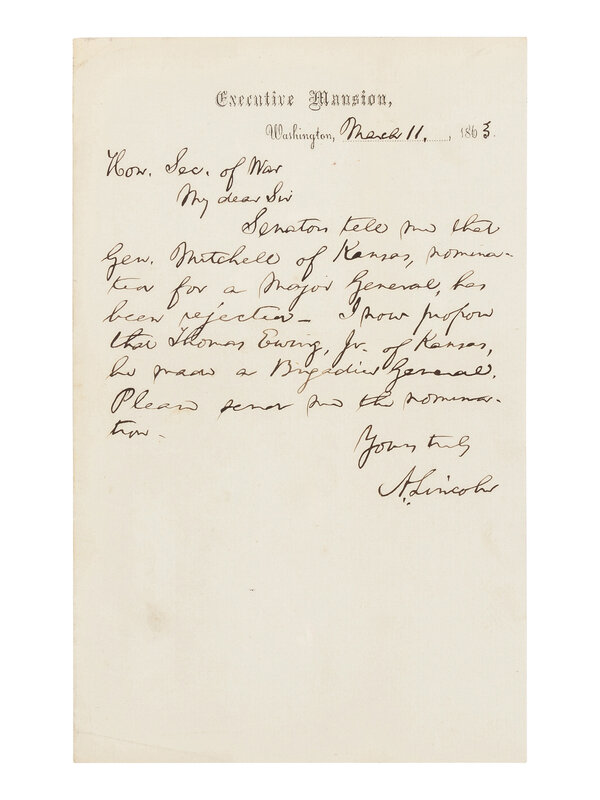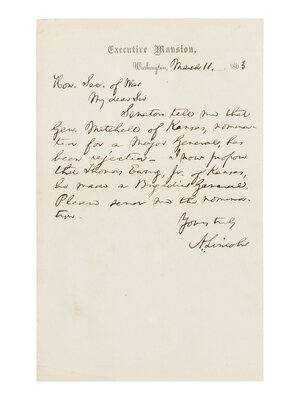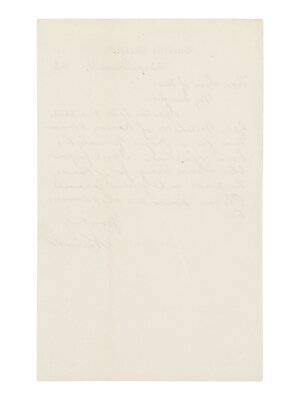Condition Report
Contact Information
Auction Specialist
Lot 79
Sale 6441 - Lincoln’s Legacy: Historic Americana from the Life of Abraham Lincoln
May 21, 2025
10:00AM CT
Live / Chicago
Own a similar item?
Estimate
$10,000 -
15,000
Price Realized
$24,320
Sold prices are inclusive of Buyer’s Premium
Lot Description
LINCOLN, Abraham (1809-1865). Autograph letter signed ("A. Lincoln") to Secretary of War Edwin M. Stanton. Executive Mansion, Washington, D.C., 11 March 1863.
1 p.; 8 x 5 in. (203 x 117 mm), on Executive Mansion stationery; creasing from old folds.
LINCOLN NOMINATES THOMAS EWING, JR. FOR BRIGADIER GENERAL
in full: "My dear Sir Senators tell me that Gen. Mitchell of Kansas, nominated for a Major General, has been rejected--I now propose that Thomas Ewing, Jr. of Kansas, be made a Brigadier General. Please send me the nomination. Yours truly A. Lincoln."
Thomas Ewing, Jr. (1829-1896) was a lawyer-turned-soldier who was instrumental in Kansas's entrance to the Union as a Free State, and who during the war issued General Order No. 11, "the single most controversial order" of the Civil War (Neely, The Last Best Hope of Earth, p. 75).
Born in Ohio, Ewing moved to Kansas in 1856 to pursue a career in politics. As a delegate in the Leavenworth Constitutional Convention, he was critical in its adoption of the antislavery Wyandotte Constitution, and afterwards became the first chief justice of the state's Supreme Court. During the Civil War he resigned his judgeship and served as a colonel in the 11th Kansas Infantry. He was appointed brigadier general two days following this letter, and given command of the District of the Border, comprised of Kansas and western Missouri. Following Confederate sympathizer and guerilla William Quantrill's raid on Lawrence, Kansas, Ewing was responsible for the issuance of General Order No. 11, which forcibly removed over 20,000 residents from rural areas in four counties of Western Missouri. Later, in September 1864, he successfully defended Fort Davidson in Missouri, repelling the invasion of Missouri by Confederate General Sterling Price.
Following the war Ewing established a law practice in Washington, D.C., and successfully defended—at cost to his reputation—Elman “Edward” Spangler, Samuel Arnold, and Dr. Samuel A. Mudd, who were accused of conspiracy in Lincoln's assassination. Ewing later returned to his home state of Ohio in 1870, where he practiced law and again became active in politics, serving as a U.S. Representative for that state for two terms.
Robert Byington Mitchell (1823-1882) was a brigadier general during the Civil War and the Governor of the New Mexico Territory, from 1866 to 1869. Basler, Second Supplement p. 181.
Provenance:
James T. Hickey, historian and collector of Lincolniana, Elkhart, Illinois
Louise Taper, Beverly Hills, California
Property from the Abraham Lincoln Presidential Foundation
This lot is located in Chicago.



